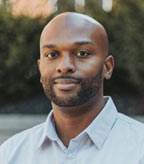Mar
13

Date: 13 March 2023
Time: 1:30 PM ET (New York Time)
Presenter(s): Dr. Donald Williamson
Download article: Article freely available on the day of the webinar for 48 hours.
Biography
 Donald Williamson (M’13, SM’22) received the B.EE. degree in electrical engineering from the University of Delaware, Newark, DE, USA in 2005, the M.S. degree in electrical engineering from Drexel University, Philadelphia, PA, USA, in 2007, the M.S. degree in computer science and engineering from The Ohio State University, Columbus, OH, USA in 2014, and the Ph.D. degree in computer science and engineering from The Ohio State University, Columbus, OH, USA in 2016.
Donald Williamson (M’13, SM’22) received the B.EE. degree in electrical engineering from the University of Delaware, Newark, DE, USA in 2005, the M.S. degree in electrical engineering from Drexel University, Philadelphia, PA, USA, in 2007, the M.S. degree in computer science and engineering from The Ohio State University, Columbus, OH, USA in 2014, and the Ph.D. degree in computer science and engineering from The Ohio State University, Columbus, OH, USA in 2016.
He is currently an Associate Professor within the Department of Computer Science and Engineering at The Ohio State University, Columbus, OH, USA. From 2016 to 2022, he was an Assistant Professor at Indiana University, Bloomington, IN, USA, where he also was recommended for promotion with tenure as an Associate Professor. Prior to earning his Ph.D., he was a Member of the Engineering Staff at Lockheed Martin. His research interests are at the intersections of machine (deep) learning, signal processing, speech processing and hearing science, with applications in speech enhancement, speech assessment, attention detection and privacy.
Dr. Williamson is a member of the International Speech Communication Association (ISCA) and the Association for Computing Machinery (ACM). His awards and honors include receiving a National Science Foundations (NSF) CAREER award, an NSF CISE Research Initiation Initiative (CRII) award, and he was a co-PI recipient of a Toyota Research Institute award. He is also a co-author on two conference papers (ICASSP and INTERSPEECH) that have received Best Student Paper awards. He has been a reviewer for many IEEE conferences and has participated in multiple IEEE SPS PROGRESS Workshops to promote diversity, equity, and inclusion.
Abstract
Deep learning has helped make speech processing applications, such as speech recognition, speech synthesis and speech translation, more prevalent in everyday life. It has also advanced the field of speech enhancement, where it has become the state-of-the-art approach to removing unwanted sounds. Successful speech enhancement can have profound impacts on how people communicate with each other and through electronic devices, so it is an area of research that must be addressed. Although several deep learning approaches have been developed, which focus on novel architectures and optimization strategies, there remains other aspects of the problem that have not been adequately investigated.
In this talk, we will discuss how human perception should be leveraged to further address problems within speech enhancement, and we will discuss how human perception can be predicted and used to improve noise reduction. Additionally, we will provide highlights of my work in complex-domain speech enhancement, which encouraged full signal reconstruction.
